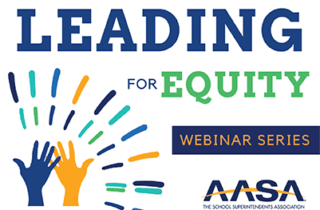Presented by Adam Bellow, Co-Founder, Breakout EDU; Dr. Dan Morris, District Leader, SAU 53 (NH); Mark MacLean, Superintendent of Schools, SAU #46 (NH), and 2020 New Hampshire Superintendent of the Year; Tom Walker, Director of Technology, Massac Unit School District #1 (IL); and Anna Logan, Director of Strategic Sales, Alma SIS
How can school districts provide more equitable outcomes for their full range of students, while also implementing anti-racist policies and procedures? The hard work and “authentic journey” required to achieve these sorts of outcomes were discussed during a recent edWebinar, hosted by AASA, The School Superintendents Association and AASA’s Leadership Network. The presentation featured Dr. Luvelle Brown, Superintendent of the Ithaca City School District (NY), Lily Talcott, Deputy Superintendent of the district, and Deborah Ptak, Principal of the district’s Lehman Alternative Community School.
Presented by Dr. Gene Kerns, Vice President and Chief Academic Officer, Renaissance; and Dr. Katie McClarty, Vice President of Research and Design, Renaissance
Presented by Dr. Nick Polyak, Superintendent, Leyden High School District 212 (IL); and Dr. Michael Salvatore, Senior Vice President, Kean University (NJ)
Moderated by Ann McMullan, Project Director, EmpowerED Superintendent Initiative, CoSN (Consortium for School Networking)
Presented by Venola Mason, Associate Partner, International Center for Leadership in Education; and Meaghan Pavlovich, Ed.D., Director, Product Management & Strategy, Houghton Mifflin Harcourt
Presented by Hilderbrand Pelzer III, Educator and Author; Carissa Berliner, Teacher and Universal Literacy Reading Coach, New York City Department of Education; and Resha Conroy, Founder, Dyslexia Alliance for Black Children
Moderated by Debbie Meyer, A’Lelia Bundles Community Scholar
Leaders in the Virginia Beach City Public Schools have been working on their equity agenda since 2015. But while their first two iterations focused more on achievement gaps and access to rigorous classes for all students, the plans didn’t address systemic inequities or really move the needle forward. During a recent edWebinar, hosted by AASA, The School Superintendents Association and AASA’s Leadership Network, Dr. Aaron Spence, Superintendent, and Dr. LaQuiche R. Parrott, Director of Diversity, Equity and Inclusion, explained why their Compass 2025 plan emphasizes equity throughout and how they keep equity front and center in their work.
For students in Jacksonville, FL and surrounding Duval County, where non-academic barriers often interfered with success in school, the implementation of mental health programs and other wellness initiatives has been accompanied by significant improvements in graduation rates and other important metrics.
The combined impact of demographic changes, accountability measures, and special education requirements have created numerous challenges for educators and administrators in recent years, which were further complicated by the pandemic and societal issues during 2020.
Even before COVID-19 created online, remote, and hybrid learning environments in school districts across the country, most district and school leaders struggled with chronic absenteeism in their schools. Researchers like Dr. Todd Rogers, Professor of Public Policy at Harvard University and Chief Scientist at EveryDay Labs, have tirelessly worked with school districts to identify, develop and implement strategies to reduce absenteeism at scale.









